
Winter Squash U-Pick Orchards in Northern Virginia in 2025, by county
Below are the U-Pick orchards and farms for winter squash that we know of in this area.
Not all areas of a state have winter squash farms that are open to the public. If you know of any others, please tell us using the add a farm form!
Remember to always check with the farm's own website or Facebook page before you go - or call or email them if they don't have a website or Facebook page. Conditions at the farms and crops can change literally overnight, so if you want to avoid a wasted trip out there - check with the farm directly before you go! If I cannot reach them, I DON'T GO!
PLEASE report closed farms, broken links and incorrect info using the "Report Corrections" form below.
New! As inflation remains high, see this page for
reliable (tested) brands of generic canning lids at lower
costs, and cost-saving measures for
getting fruit and vegetables and home canning.
If you are having a hard time
finding canning lids, I've used these, and they're a great price & ship in 2 days.
New! Road tripping and camping is a great way to have a fun, safe and inexpensive family trip. The national and state parks and monuments are open, and campgrounds usually cost between $10 and $40 per night. September to November is the best camping weather. See our new website Road Tripping and Camping.com for tips, tricks, guides, checklists and info about parks, monuments and other places to visit.
New! We just went live with our latest website, FunFactoryTours.com - As they name implies, you can find a fun factory tour, including chocolate, automobiles, historical forts and sites, famous buildings, Active Federal facilities even fun geology: like fossils and volcanic areas
Clarke County
- Mackintosh Fruit Farm - apples, asparagus, apricots, beans, beets, blackberries, blueberries, broccoli, carrots, cherries, cucumbers, eggplants, flowers, grapes, herbs or spices, nectarines, onions, peaches, peppers, pumpkins, raspberries (red), raspberries (Spring, red), raspberries (Autumn, red), raspberries (black), raspberries (Spring, black), raspberries (Autumn, black), rhubarb, summer squash, winter squash, strawberries, tomatoes, other vegetables, Honey from hives on the farm, Fresh eggs, Cider mill (fresh apple cider made on the premises), U-pick and already picked, farm market, concessions or refreshment stand, restrooms, picnic area, birthday parties, weddings and wedding parties, school tours, group reservations
1608 Russell Rd, Berryville, VA 22611. Phone: 540-955-6225. Email: lori@mackintoshfruitfarm.com. Open: Wednesday to Sunday, from 8 am to 6 pm, May to October 31 and on Memorial Day, July 4 Thursday, Labor Day, Columbus Day, and Halloween . Directions: Route 7 West Take right onto Russell Road 1.5 miles on the right. Click here for a map and directions. Payment: Cash, Check, Debit cards, Visa, MasterCard, Discover, AmEx.
Mackintosh Fruit Farm Facebook page. 5 miles on the right. . Events: Peach Festival, Honey Bee Day, Honey Crisp Day, Apple Butter Day, monthly farm dinners, and cider pressing; Calendar-May-strawberries, asparagus, rhubarb, and greens; June - strawberries, sweet cherries, raspberries, blueberries, broccoli, onions, and flowers; July-blackberries, black raspberries, blueberries, donut peaches, peaches, corn, eggplants, peppers, and tomatoes; August-apples, Asian pears, yellow and white peaches, plums, grapes, and honey; September-apples, pawpaws, honey crisp apples, Asian pears, and potatoes; October -apples, pumpkins, fall squash, sweet potatoes, and cider. . All pick your own fruit and vegetables are also available as pre-picked in the market for purchase. Events: We can also host your events including: group meetings, school tours, weddings, and rehearsals. Call for more details. (UPDA..
[ Click here to update the listing ]
Fauquier County
- Hollin Farms - Uses integrated pest management practices, apples, beans, blackberries, blueberries, corn (sweet), cucumbers, eggplants, flowers, pears, peaches, peppers, plums, pumpkins, raspberries (red), summer squash, winter squash, strawberries, tomatoes, other vegetables, porta-potties are available
1524 Snowden Road, Delaplane, VA 20144. Phone: 540-592-3574. Email: hollinfarms@gmail.com. Open: Wednesday to Sunday, from 9 am to 4 pm, Mid May through October; Always check our website for current availability and weather related changes for strawberries and Spring vegetables mid May through mid June; Open for Peaches, plums, berries and summer vegetables from early July until late August; Apples, Pumpkins, and fall vegetables in September and October. Directions: From Washington, take I-66 west to Exit 23 \\(Route 17 north\\). Continue on Route 17 for about 7 miles. Turn left on Route 688 \\(Leeds Manor Road\\). Go exactly 1 mile to the Hollin Farms entrance. Hollin Farms is the second orchard on Leeds Manor Road. Follow signs. Click here for a map and directions. Payment: Cash, Check, Debit cards, Visa, MasterCard.
Hollin Farms Facebook page. Continue on Route 17 for about 7 miles. Turn left on Route 688 (Leeds Manor Road). Go exactly 1 mile to the entrance. is the second orchard on Leeds Manor Road. Follow signs. . We use integrated pest management practices. . is as much an educational experience as it is a treat for the senses. Young and old alike will delight in the pleasurable work of picking fruits and vegetables from right where they are grown, high on the eastern slope of the Blue Ridge mountains, on a real working farm. Our sunny slopes and majestic panoramic views are legendary and will keep you coming back to greet each season. Abundant selection of fruits and vegetables, with over 15 acres of vegetables and 30 acres of fruit trees! 45 minutes west of beltway. Dogs welcome on a leash but not in the strawberry patch or the vegetable gardens. No Admission Fee. We take credit cards.Typical harvest dates are: May, June: strawberries and spring vegetablesLate June, early July: ra..
[ Click here to update the listing ]
Loudoun County
- Great Country Farms - Uses integrated pest management practices, apples, blackberries, blueberries, broccoli, cherries, grapes, other berries, peaches, plums, pumpkins, raspberries (red), raspberries (Spring, red), raspberries (black), summer squash, winter squash, strawberries, other vegetables, Honey from hives on the farm, Fresh eggs, concessions or refreshment stand, porta-potties are available, restrooms, picnic area, picnic area you may bring your own food, jumping pillow, pedal kart track, mining for gems, mini-golf, farm animals, birthday parties, weddings and wedding parties, school tours, group reservations
18780 Foggy Bottom Road, Bluemont, VA 20135. Phone: 540 554 2073. Email: social@greatcountryfarms.com. Open: Monday - Sunday, 10am to 5pm, March 19th - May 20th; Monday - Sunday, 9am to 6pm, May 21st - October 30th. Directions: . Click here for a map and directions. Payment: Cash, Check, Debit cards, Visa, MasterCard.
Great Country Farms Facebook page. We use integrated pest management practicesStrawberries: May Blackberries: July Peaches: August Apples: September Pumpkins: Pumpkins Please visit our web page for other U-Pick items and confirmed datesWe minimize use of pesticides and other chemicalsPayment: Cash, Check, Visa, MasterCardFrom strawberries and asparagus in the spring to corn and tomatoes all summer then pumpkins and gourds in the fall, offers a farm experience your whole family will enjoyHelp your children understand how food is grown and how fresh and full of flavor it can beIt is amazing how children will eat produce if they have picked it themselves! Pick your own fruit and veggie farm featuring Non-GMO produce grown using regenerative farming practices, an award-winning CSA program, and seasonal festivals! is a 400 acre working farm with pick your own produce, a Farm Market, CSA, and so much more! [ Click here to update the listin..
[ Click here to update the listing ] - Sprouting Roots Farm - Uses natural growing practices, beets, cucumbers, eggplants, flowers, herbs or spices, kale, melons, onions, peppers, summer squash, winter squash, tomatoes, other vegetables, watermelons, Other fruit or veg, restrooms
15669 Limestone School Road, Leesburg, VA 20176. Phone: (571) 226-0824. Email: info@sproutingrootsfarms.com. Open: Hours and availability of crops to pick varies considerably; please text, call or email for current availability and hours; Typical season is from mid June through October ; in season, Saturday and Sunday, from 9 am to 12 pm. Directions: . Click here for a map and directions. Payment: Cash, Venmo, PayPal, Debit cards, Visa, MasterCard, Discover, AmEx.
Sprouting Roots Farm Facebook page. We use natural practices, but are not seeking organic certification(UPDATED: May 7, 2025, JBS) (ADDED: September 23, 2021)
[ Click here to update the listing ]
Shenandoah County
- Deauville Farm - Uses natural growing practices, beans, beets, cucumbers, peppers, pumpkins, winter squash, tomatoes, Fresh eggs
7648 Crooked Run Road, Basye, VA 22810. Phone: 540 856-2130. Email: deer1@shentel.net. Open: Friday, Saturday, Sunday, and Monday, from 10am to 4 pm, April through November. Directions: from Mount Jackson I81 exit 273, Route 11 south to route 263 west. Go 13 miles to Basye. First right after Bryce Resort \\(Alum Springs Road route 717. Go 3 34 mi, turn right onto Crooked Run Road. Second driveway on left. Click here for a map and directions. Payment: Cash, only. Go 13 miles to Basye. First right after Bryce Resort (Alum Springs Road route 717. Go 3 3/4 mi, turn right onto Crooked Run Road. Second driveway on left. . We use natural practices, but are not seeking organic certification. Previously a deer farm, Deauville is now a small farm offering PYO heirloom veggies and eggs. on weekends, April through November guests who come to see the animals and gardens, and to buy venison, eggs, vegetables or plants. You can pick your own vegetables beginning in late April with salad greens, followed by a wide range of summer veggies including over a hundred varieties of heirloom tomatoes. [ ] (UPDATED: May 7, 2025, JBS)
[ Click here to update the listing ]
Winter Squash
Winter Squash Picking Tips, Recipes and Information
Winter squash comes in many sizes, shapes and colors. Choosing a winter squash that meets your needs and the taste you will like can be tough without a guide! This page provides you that information, plus nutritional analysis and links to our freezing and canning pages!
Unlike its summer squash, which is best when harvested very young and used right away, winter squash is harvested at a mature age, which makes the outer skin hard and inedible. The skin, however, is protective and increases its storage life. Winter squash can be stored for 3 months or longer if kept in a cool dark place, like a basement or garage. I've had winter squash last a full year when stored like this!
The yellow and orange flesh of the winter squash is more nutritious and richer in vitamins, especially beta carotene, than summer squash. Winter squash is always served cooked and, because of its tough skin, only the inside flesh is eaten. The flesh, is sweet and great to make pie (pumpkins are a winter squash)
Size:
Choose a size based on your cooking needs. There's no difference in flavor based on size of the same variety of a squash.
Appearance:
For a quality squash, choose one that has a smooth, dry rind and is free of cracks or soft spots. Skin that is easily nicked or scraped with a fingernail means that the squash did not reach maturity. Look for rind that has a dull appearance. A shiny rind indicates that is has been picked too early or has a wax coating, which masks the skin. Choose squash that has a deep color and is heavy for its size. It is also best to choose squash with a firm, rounded, dry stem. Squash with no stem permits bacteria to enter.
Cut pieces can be found in the grocery market. Choose pieces that have a good interior color and finely-grained flesh that is not fibrous. Ideal flesh should be barely moist, but not too dry or too watery.
Storing Winter Squash
Winter squash has a long shelf life and can be stored for up to 3 months or longer in a cool, dry place between 55° and 60°F. A higher temperature will shorten storage time, but it will not alter the flavor. Storage temperatures below 50°F (as in a refrigerator) will cause squash to spoil more rapidly. If the squash needs to be refrigerated, it can be stored for 1 to 2 weeks. Cut pieces of squash should be tightly wrapped and refrigerated. Cooked, pureed squash can be frozen for use later as a side dish or to thicken, color, or flavor soups, sauces, or stews.
Varieties of Winter Squash
Here are a few of the most popular winter squash varieties; see this page for a complete master list of winter squash varieties.
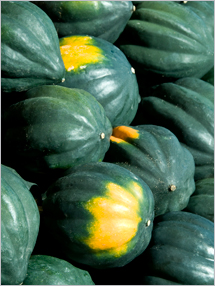 |
Acorn This acorn-shaped squash is one of the most widely available among the small winter squash. It measures about 6 inches around and weighs 1 to 2 pounds. Baking is an excellent way to bring out the sweet, nutty flavors of this tender fleshed squash. |
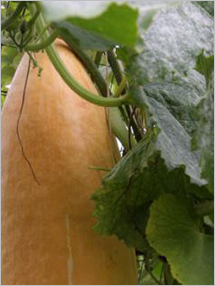 |
Banana This squash comes in three varieties: blue, orange, and pink. Among the three varieties, the pink banana is the most common in the United States. It is grown commercially in Florida. This large, thick-skinned cylindrical squash averages 20 inches long and weighs around 12 pounds. It is so large that it is usually sold in chunks instead of whole. Its creamy textured orange flesh offers a fruity and buttery delight to your palate. Although both baking and steaming are great ways to prepare this tasty squash, steaming produces a slightly sweeter, yet mild flavor. |
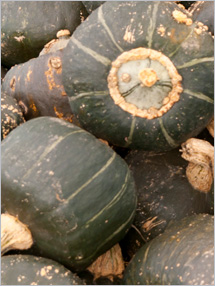 |
Buttercup This stocky squash is 6 to 8 inches in diameter, averaging 2 to 4 pounds. Its popularity stems from its sweet and creamy orange flesh. Its shortcoming is that it tends to be a bit dry. Baking or steaming can solve this problem; the dry flesh becomes smooth and tastes similar to a mixture of honey, roasted chestnuts, and sweet potato. Even more than baking, steaming softens the flesh and creates a thick puree (Great for pies) |
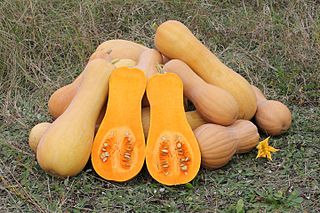 |
Butternut This elongated bell-shaped squash measures about a foot long and weighs an average of 2 to 4 pounds. Its popularity is due to its meaty, yet moderately sweet golden orange flesh. Because of its thin skin, this squash can easily be skinned with a vegetable peeler, which makes it easy to cut and prepare. Baking enhances its sweet, moist, and nutty flavors. Butternut squash is usually available from August through March. There are actually many variations of butternut. It can be used to make great "pumpkin" pies. |
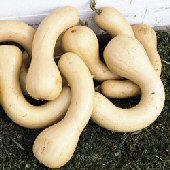 |
My favorite winter squash is one called
"Argos Gold", sometimes also simply called "Mexican Butternut" - it is
much longer than the usual "Waltham" butternut, often almost 2 feet long
and has a much sweeter taste and smoother texture. I've finally found
one supplier,
see this
page. I found another winter / butternut-type squash at Gurney's that looks promising . |
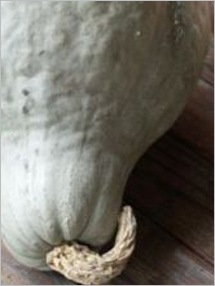 |
Hubbard This tear-shaped squash comes in several varieties: green (true), golden, blue, and baby blue. It ranges from dark green to orange and weighs from 5 to 50 pounds. Because of its size, Hubbard's popularity has decreased over the years. However, pre-cut portions of green and orange Hubbard can be found in markets. Green Hubbard's are thick, sweet, and dry. Golden Hubbard's; a smaller squash than the green or blue; are fairly sweet, but have a bitter aftertaste.The Blue or gray varietiey make wonder pumpkin pies! |
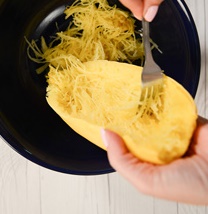 |
Spaghetti This oval-shaped yellow squash is also called the vegetable spaghetti. It averages 9 inches in length and may weigh 2 to 3 pounds. When cooked, the crisp, tender fhesh falls a apart into spaghetti-like strands that have a mild lightly sweet and fresh taste. Keep in mind that the larger the vegetable, the thicker the strands and the more flavorful the taste. It really is good with spaghetti sauce on the cooked squash "noodles" |
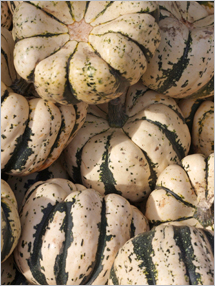 |
Sweet Dumpling This solid round squash, formerly known as the vegetable gourd, is a perfect serving for one person. It is about the size of an apple and weighs up to 1 pound. The skin is a warm cream color striped with ivy green, and it changes to butter color and orange during storage. The skin is relatively tender and can be eaten. The pale-yellow flesh is smooth, fine, and dry as a potato and produces a rich starchy, light to mild sweetness, with a slight corn flavor. |
Other Local Farm Products (Honey, Horses, Milk, Meat, Eggs, Etc.)
(NOT pick-your-own, unless they are also listed above)
- Farm markets and roadside stands
- Local Honey Finder
- Local Meat, Milk and Eggs
- Venues: Farms, Wineries, Orchards for your event, wedding or party
- Easter egg hunts
- Children"s consignment sales
- Fruit and vegetable festivals
- Winery tours and wine tastings
- Horse rides, stables, lessons, trails
- Maple Syrup farms and sugarworks
- Bed & Breakfasts on Farms, Wineries, Ranches and Orchards
- Pumpkin patches
- Corn mazes
- Zombie Paintball venues
- Christmas Tree Farms & lots
- Environmental resources
- Consumer fraud information
- Wholesale food sources
- Resources for Farmers
Looking for canning equipment and supplies?
Water bath canner with a jar rack
Pressure canners for gas, electric and induction stoves: Presto 23Qt or T-fal 22Qt
Canning scoop (this one is PERFECT)
Ball Blue book (most recent version)
Jars: 8oz canning jars for jams
Find Other types of farms:
Farm markets and roadside stands
Road trips and camping resources
Local Honey, apiaries, beekeepers
Consumer fraud and scams information
Home canning supplies at the best prices on the internet!
Maple Syrup Farms, sugarworks, maple syrup festivals
Environmental information and resources
Farms For Your Event for birthday parties, weddings, receptions, business meetings, retreats, etc.
Festivals - local fruit and vegetable festivals
Get the
most recent version of
the Ball Blue Book
With this Presto 23 quart pressure canner and pressure cooker, you can "can" everything, fruits, vegetables, jams, jellies, salsa, applesauce, pickles, even meats, soups, stews. Model 01781

You can make jams, jellies, can fruit, applesauce, salsa and pickles with water bath canners, like this Granite Ware 12-Piece Canner Kit, Jar Rack, Blancher, Colander and 5 piece Canning Tool Set

